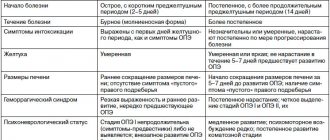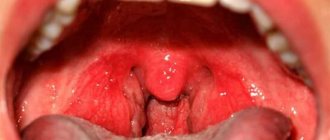ICD - pharyngitis:
- J02 - acute pharyngitis
- J02.0 - streptococcal pharyngitis
- J02.8 - acute pharyngitis caused by other specified pathogens
- J02.9 - acute pharyngitis, unspecified
- J31.2 - chronic pharyngitis
- J31.1 - chronic nasopharyngitis
Pharyngitis is rarely isolated as a separate disease; the diagnosis is usually acute respiratory viral disease (ARVI).
ARVI is a general name; the doctor usually specifies how exactly ARVI manifests itself.
This may be rhinitis (runny nose), pharyngitis (red throat), nasopharyngitis (inflammation of the nose and throat), etc.1,2
It is important not to confuse pharyngitis with tonsillitis.
To do this, let's understand the structure of the pharynx and oral cavity.
Manifestations
- Acute pharyngitis may cause sore throat, dryness, tickling, burning, discomfort and pain in the throat, which worsens when swallowing. Less commonly, general malaise occurs; the temperature may rise to 37.5-38°C. When the lateral ridges of the pharynx become inflamed, the pain can radiate to the ears. On palpation, enlargement and tenderness of nearby lymph nodes may occur.
- Chronic pharyngitis is not characterized by an increase in temperature and a significant deterioration in general condition. The patient feels dry, itchy, and there may be a feeling of a lump in the throat, which causes a desire to cough.
Structure of the pharynx
The pharynx is divided into 3 sections:
- upper (nasopharynx)
- middle (oropharynx)
- lower (larynx)
This division is very conditional, because There are no clear boundaries between departments. When inflammation occurs, it rarely happens that the inflammatory process is localized in one section; usually infectious processes spread and move throughout all sections of the pharynx5,7
As can be seen in the picture below, the oropharynx is composed of the velopharyngeal arches, the uvula and the soft palate.
Pharyngitis usually affects:
- temples
- tongue
- soft sky
- posterior wall of the pharynx
The doctor uses a spatula to completely examine the pharynx. It is needed to improve visibility of the back of the throat.
The palatine tonsils also become inflamed with pharyngitis, because it is impossible to limit the inflammation process. This widespread nature of inflammation in pharyngitis distinguishes it from tonsillitis, where the tonsils are predominantly affected.
How common is pharyngitis?
Pharyngitis, like a common ARVI (viral infection), occurs quite often. The incidence rate increases during the season from September to May, with a peak in February and March. A decrease in the incidence of pharyngitis by 3-5 times is observed in the summer months.10,11
Acute pharyngitis occurs more often in childhood than in adults. Children under 5 years of age suffer viral infections, including pharyngitis, 6-8 times a year.8,9
In the first year of visiting a preschool institution, the incidence of the disease is 10-15% higher than in children at home. But, unfortunately, “home” children subsequently get sick more often at school age.
Causes of pharyngitis and tonsillitis
Etiology (origin, cause) of pharyngitis. In 70-90% of cases, pharyngitis is caused by viruses. Pharyngitis can also be caused by bacteria, fungi, allergies, injuries, and exposure to irritating factors.
The most common viruses are rhinoviruses, adenoviruses, influenza, parainfluenza, enteroviruses, Coxsackie A, coronaviruses, a group of herpes viruses (Epstein-Barr virus, cytomegalovirus, HSV).12
There are pharyngitis, which are classified as a separate diagnosis depending on the pathogen, for example streptococcal pharyngitis ICD J02.0
Classification of pharyngitis
Pharyngitis can be acute or chronic. Acute is inflammation that just arose (suddenly), and chronic is a disease that persists for a long time, and it may not bother a person, but under certain circumstances again cause complaints and anxiety.3
| CLASSIFICATION | A COMMENT | ||
| classification: | Classification of pharyngitis due to its occurrence: | a comment: | viral bacterial fungal allergic traumatic caused by exposure to irritating factors caused by gastrointestinal diseases (gastroesophageal reflux, stomach diseases, etc.) |
| classification: | Pharyngitis associated with specific pathogens: | a comment: | Epstein Bar virus for infectious mononucleosis Yersinia enterocolitica for yersinial pharyngitis gonococcus for gonorrheal pharyngitis Leptotrix buccalis for leptotrichosis of the pharynx |
| classification: | Types of chronic pharyngitis: | a comment: | hypertrophic (enlargement of the mucous membrane) atrophic (depletion of the mucous membrane) catarrhal (standard inflammation) mixed |
Diagnosis of pharyngitis
Acute pharyngitis can be determined by patient complaints and examination of the oropharynx (pharyngoscopy).
Objective symptoms of pharyngitis, which are assessed by a doctor when examining the throat:
- swelling and hyperemia (redness) of the pharyngeal mucosa
- purulent or mucopurulent plaque on the walls of the pharyngeal mucosa
- the presence of inflammation in the arches, tonsils, orifices of the auditory tubes
- the presence of bright red tubercles on the back surface of the pharynx and on the side - hypertrophied (enlarged) lymphoid follicles
- thinning of the mucosa with areas of exfoliating epithelium, crusts and viscous mucus (atrophic pharyngitis)
Based on this, the doctor can make not only a diagnosis of pharyngitis, but also suggest its cause (viral inflammation, fungal infection, etc.).
Despite the fact that 70% of acute pharyngitis is a viral disease, sometimes it is necessary to exclude a bacterial cause. This is very important for further treatment tactics and prevention of complications. To do this, you should conduct a rapid test to exclude the streptococcal nature of pharyngitis.
In some cases, with fever, long-term complaints, or a temperature exceeding 3 days, it is also necessary to take a general blood test to understand the cause of acute pharyngitis.
What can a doctor prescribe for the treatment of chronic pharyngitis?
Pharyngitis in the initial stages of its development is dealt with by otorhinolaryngologists (ENT doctors), but the help of immunologists is often required. For chronic granulosa pharyngitis, treatment may include surgery - removal of enlarged lymphoid tissue of the pharynx1.
Comprehensive treatment of pharyngitis may include:
- antibiotics – in case of bacterial, especially streptococcal infection;
- antihistamines – for severe swelling of the pharyngeal mucosa and the allergic nature of the disease;
- immunotropic drugs that enhance the body’s natural defenses;
- vitamin-mineral complex preparations1.
Local treatment includes solutions and sprays, lozenges and lozenges with antiseptic, antimicrobial, antiviral, anti-inflammatory and analgesic effects1.
To irrigate the throat, the doctor may recommend HEXORAL® spray based on hexethidine, a broad-spectrum antiseptic that is active against bacteria and some viruses that cause inflammation of the respiratory tract5,6. The drug is allowed to be used not only in the treatment of chronic pharyngitis in adults, but also for local treatment of the disease in children from the age of three6.
For gargling, a solution of HEXORAL® based on hexethidine with the addition of essential oils can be used on the recommendation of a doctor from the age of three6.
Lozenges with a neutral mint flavor HEXORAL® TABS based on chlorhexidine and benzocaine can be suitable for both adults and children over 4 years old6.
For adults and children over 6 years old, HEXORAL® TABS CLASSIC is available with the flavors of orange, blackcurrant, lemon and honey. It is based on the antiseptic amylmetacresol6. HEXORAL® TABS EXTRA may be suitable for children over 12 years of age and adults. The lidocaine it contains can relieve even severe sore throats6.
In conclusion, we add: to get rid of the symptoms of chronic pharyngitis, you need to eliminate the provoking and causative factors. It is important to give up cigarettes and alcohol, protect the respiratory tract from polluted air, and treat associated diseases with specialists1.
The information in this article is for reference only and does not replace professional advice from a doctor. To make a diagnosis and prescribe treatment, consult a qualified specialist.
Up to contents
Complications of pharyngitis
Acute pharyngitis usually responds well to treatment. The prognosis for viral pharyngitis is recovery.
Bacterial (streptococcal pharyngitis) can be complicated by the formation of a retropharyngeal abscess, and subsequently have a negative effect on the heart and kidneys, causing endocarditis and glomerulonephritis.
Symptoms of pharyngitis can persist even with proper treatment, if the true cause of pharyngitis is not eliminated. For example, if gastroesophageal reflux disease (damage to the gastrointestinal tract) is not treated, then pharyngitis will constantly remind itself.
Acute pharyngitis can become chronic.
Treatment
Pharyngitis is a rather unpleasant disease, especially its chronic form, when remission is replaced by exacerbation, and this lasts for many years, exhausting the patient.
Practice shows that the most effective fight against the disease is complex treatment. First of all, it should affect the causes of pharyngitis. In this way, it is not the symptoms of the disease that are eliminated, but what causes it. Elimination of symptoms is an additional factor that alleviates the patient’s condition.
During therapy, the full range of drugs is used: anti-inflammatory, analgesic, antibacterial and antiseptic. This allows you to achieve a quick effect in healing.
Modern medications used for both forms of pharyngitis soften and moisten the throat. As a result, unpleasant symptoms are significantly alleviated. Tickling, tickling, pain become less noticeable.
If the disease is caused by an infectious cause, the treatment uses a special spraying method. The throat is treated with aerosol preparations that act on a combined principle - they relieve pain and work as an antiseptic. As a result, treatment occurs simultaneously on two fronts, making it as effective as possible.
The choice of means by which treatment will take place depends on what caused the disease. An antibacterial agent must be effective against a specific microorganism. In severe cases, the disease must be treated with appropriate medications. However, prescribing a strong medicine is not always justified.
Allergic pharyngitis is treated with antihistamines. A treatment complex based on this basis has been developed and successfully applied. Acute allergic pharyngitis is treated with the help of immunomodulators, which stimulate the patient’s immunity to produce its own protective resources.
In the chronic form, sanitation procedures are indicated. They allow you to rid the treated surface of the mucous membranes from foci of infection.
Prevention of pharyngitis
To prevent pharyngitis, it is recommended:
- avoid hypothermia and dress appropriately for the weather
- avoid contact with tobacco and chemical irritants
- carry out frequent ventilation of working and living spaces
- walk outdoors more often. Walking will help strengthen the body's defenses in the fight against pharyngitis.
- don't drink ice water
- do not share food and cutlery, cups
- avoid crowded places and, if possible, stay in them for as little time as possible
- use disinfectants, including in public places,
- transport, etc.
- wash your hands often
Pharyngitis in pregnant women
During pregnancy, a woman's body's protective properties decrease. In this regard, the risk of contracting infectious diseases, as well as exacerbation of chronic diseases, greatly increases.
Pregnant women need to carefully monitor their health and prevent diseases: avoid contact with people with respiratory diseases, avoid crowded places, wash your hands, eat regularly and properly.
If you develop acute pharyngitis or exacerbation of chronic pharyngitis, treatment is required. It is not recommended to use drugs that can affect the entire body. They can pass through the placenta to the baby and cause harm to him. To treat pharyngitis, pregnant women are advised to consult a doctor and use saline mouth rinses.
Provoking factors for the development of pharyngitis
In addition to the causes of the disease (which are infectious agents), the development of pharyngitis is significantly influenced by some environmental factors and bad habits:
- polluted atmospheric air;
- exposure to extreme conditions – hypothermia;
- aggressive chemical particles in the inhaled air;
- habit of eating very hot or very cold food, drinking ice-cold drinks;
- smoking (tobacco, hookah);
- background allergy and its seasonal exacerbation;
- excessively dry air.
Poor nutrition weakens all types of immunity, when the body “overloads” calories and does not receive the substances that are needed for complete cell repair: animal protein, vitamins and microelements.
A risk factor is pregnancy, when the mother's body wastes many resources, and hormonal changes change the reactivity of tissues. Treatment of pregnant women is a difficult task when the leading role is given to local drugs that cannot be absorbed into the blood and harm the fetus.
The situation is worsened by chronic diseases of the internal organs, when the metabolism is perverted and the body cannot quickly and effectively respond to the invasion of infection. Dental problems (especially teeth that have been in an untreated condition for a long time) often provoke inflammation in the oral cavity and pharynx.
FAQ
Can pharyngitis be treated at home?
Pharyngitis usually does not require hospitalization (hospital treatment). You can treat strep throat at home on your own by using topical remedies to relieve sore throat and sore throat. If, after self-treatment, the sore throat does not go away within 3 days, then you should consult a doctor. If you have a fever in addition to a sore throat, you should immediately consult a doctor.
Which doctor should I contact if I have a sore throat?
If you have a sore throat, sore throat, or difficulty swallowing, you should first consult a therapist or pediatrician if you are a child. If there are indications, the doctor will prescribe a consultation with an ENT doctor.
Very severe sore throat. Are you sure I don't have a sore throat?
With pharyngitis, the pain syndrome may be more pronounced than with tonsillitis (tonsillitis). To treat pharyngitis, it is good to use a remedy that has an analgesic effect, for example Tantum® Verde. To exclude sore throat (streptococcal tonsillitis) or streptococcal pharyngitis, it is recommended to conduct a rapid test (streptotest).
Do you need an antibiotic for pharyngitis?
The antibiotic is indicated ONLY for bacterial pharyngitis. For a quick diagnosis, perform a rapid test for streptococcus. It will allow you to exclude or confirm the bacterial nature of pharyngitis. If streptococcus is detected, the doctor will prescribe antibiotics.
Is strep throat contagious?
Most often, strep throat is a viral disease, so a person can shed the virus and infect other people. A sick person is contagious, so you should stay at home until you recover.
What happens if pharyngitis is not treated?
Complications may arise. If pharyngitis is not treated, complaints persist much longer, inflammation does not go away and begins to become chronic.
Is it possible to get vaccinated for pharyngitis and when?
Against the background of an acute illness or exacerbation of chronic pharyngitis, vaccination is contraindicated. Wait until you have fully recovered and then you can get vaccinated. The exception is vaccination against influenza. It can be done when the temperature is normalized, i.e. There is no need to wait for all symptoms to disappear.
Is it possible to eat cold food if you have a sore throat?
If you have pharyngitis, it is not recommended to eat very cold foods, including ice cream. This can increase inflammation and slow down recovery.
Causes of the disease
A natural process for humans is nasal breathing.
The nasal passages are designed so that inhaled air enters with a slight delay. During these pauses, it warms up, is filtered and in this form is supplied to the body. When the nose is stuffy and breathing occurs through the mouth, the risk of pharyngitis increases - because the air does not pass through the “filters” and enters through the mouth with bacteria, viruses, dust, etc. The unnatural process causes the pharynx to dry out, it becomes a favorable environment for the development of pathogenic flora . The second common cause of pharyngitis is a runny nose due to ARVI. In this case, the source of inflammation is in the throat, developing gradually. Frequent treatment of the nasal passages with vasoconstrictor drops negatively affects the condition of the pharynx, which also causes the development of the disease.
Other reasons include:
- vitamin deficiency and malnutrition;
- bad habits;
- injuries;
- individual characteristics in the structure of the nasopharynx;
- long-term treatment with antibiotics;
- chemical fumes;
- ingress of allergens.
Often, pharyngitis is caused by previous diseases, for example, diabetes mellitus, dental caries, heart failure, kidney failure, sinusitis, sinusitis and others.










